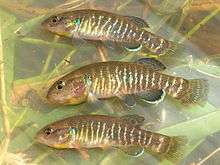Umbridae
The Umbridae (mudminnows) are a family of Actinopterygii, ray-finned fish that inhabit freshwater environments in temperate regions across the Northern Hemisphere. They are generally small fish, with the largest species reaching 33 cm (13 in) in length, and most less than half that.[1]
| Umbridae | |
|---|---|
 | |
| Scientific classification | |
| Kingdom: | |
| Phylum: | |
| Class: | |
| Superorder: | |
| Order: | |
| Family: | Umbridae |
| Genera | |
Distribution
The genus Umbra contains three species: the eastern mudminnow (Umbra pygmaea), the central mudminnow (U. limi, Kirtland 1840[2][3]), and the European mudminnow (U. krameri). The eastern mudminnow can be found across the eastern United States and southeastern Canada. The central mudminnow ranges throughout the Great Lakes region and Mississippi River basin of North America. The European mudminnow can be found in the Danube and Dniester River basins of Europe.[4] Umbra spp. are most commonly found in the Atlantic coast regions of North America, along the marshy, low-oxygen areas of the Mississippi River, and in similar environments in Europe. The genus Novumbra contains the species N. hubbsi, the Olympic mudminnow. It can be found on the west coast of North America. The Alaska blackfish, (Dallia pectoralis) is found throughout Alaska and a small region of northeastern Siberia. The Ontario Fishery Regulations define the family Umbridae as bait fish.[5]
References
- Froese, Rainer, and Daniel Pauly, eds. (2008). "Umbridae" in FishBase. December 2008 version.
- General College and James Ford Bell Museum of Natural History - University of Minnesota, Minneapolis/St. Paul, 23 October 2002
- Appendix B. Description of the Connecticut River Basin, Table 3. Fishes Within the Connecticut River Basin. U.S. Fish and Wildlife Service
- Kottelat, M., 1997. European freshwater fishes. Biologia 52, Suppl. 5:1-271.
- RUFFE CONTROL PROGRAM, Submitted to the Aquatic Nuisance Species Task Force by the Ruffe Control Committee, Thomas R. Busiahn, Chairman, November 1996